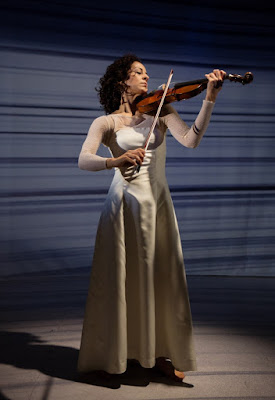The Last Wife is Kate Hennig’s
imaginary recreation of the relationship of Henry VIII and Katherine Parr, his
last wife. But this is no period drama with 16th century costumes
and English accents. There is a model of Hampton Court Palace hovering over the
stage but the characters wear modern dress and speak in current colloquial
English in their Ontario accent.
Hennig has grafted twenty-first century
language, issues and attitudes onto early modern characters without much attempt
at historical accuracy. But in many respects, she is faithful to the
characters.
Jonah Q. Gribble, Maev Beaty, Joseph Ziegler and Bahia
Watson, photo: Cylla von Tiedemann
The corpulent Henry VIII is played by slim
Joseph Ziegler. The statuesque and passionate Katherine is played by Maev
Beaty. Henry is an exemplar of the absolute monarch. Capricious, dictatorial,
selfish, egotistical and amoral, he does not need any scruples and can and does
order people killed almost on a whim. He feels he is entitled to do whatever he
wants with very little in the way of legal or moral constraint.
Hennig tries to show a humane side to Henry but
that only happens when one agrees with him.
Parr is an intelligent and beautiful woman. She
must use all her wiles to survive in a patriarchal society run by men,
especially one man. She is in love with her relative Thom (Gareth Potter) but
when Henry “asks” her to marry him she has no choice but to dump him. Thom is
dispatched out of the country. She shows genuine love for Henry but tries to be
more than a pawn in his hands. She has some influence but in the end her only
weapon seems to be her sexual attraction.
Hennig dramatizes Henry’s two daughters, Mary
and Elizabeth as modern teenagers and his son Edward as a youngster. Mary shows
characteristics that will gain her the moniker Bloody when she becomes queen
and Elizabeth gets better press because she will become the great queen.
Beaty and Ziegler give superb performances
representing somewhat fictionalized historical figures in a completely
different milieu. Ziegler does not look, talk or dress like Henry VIII. He is a
tyrant who issues a death warrant for his wife because he disagreed with her.
The sixteenth century Henry did just that but there is a problem with Hennig’s
setting of the play with that happening.
The fight for women’s rights was perhaps as
cogent then as it has been in the past century but I doubt if it was expressed
the way Parr does in the play. Elizabeth became queen eleven years after
Henry’s death but in the mindset of the day one can hardly claim a big leap
forward in women’s rights. Hennig imposes a different mindset on these people
that if it existed, was in its nascent form and developed slowly over the next
century. In Canada, the Supreme Court ruled in 1928 that a woman is not a
person eligible to sit in the Senate.
My fascination with the historical context of
the play and the issues were reduced by the context. Once past that, you will
found a piece of theatre that is well acted, well directed and very much worth
seeing.
The Last Wife premiered in the
Studio Theatre as part of the 2015 Stratford Festival with the same cast.
______
The Last Wife by Kate Hennig continues at the Young Centre for
the Performing Arts, 55 Tank House Lane, Toronto, Ontario. www.soulpepper.ca










